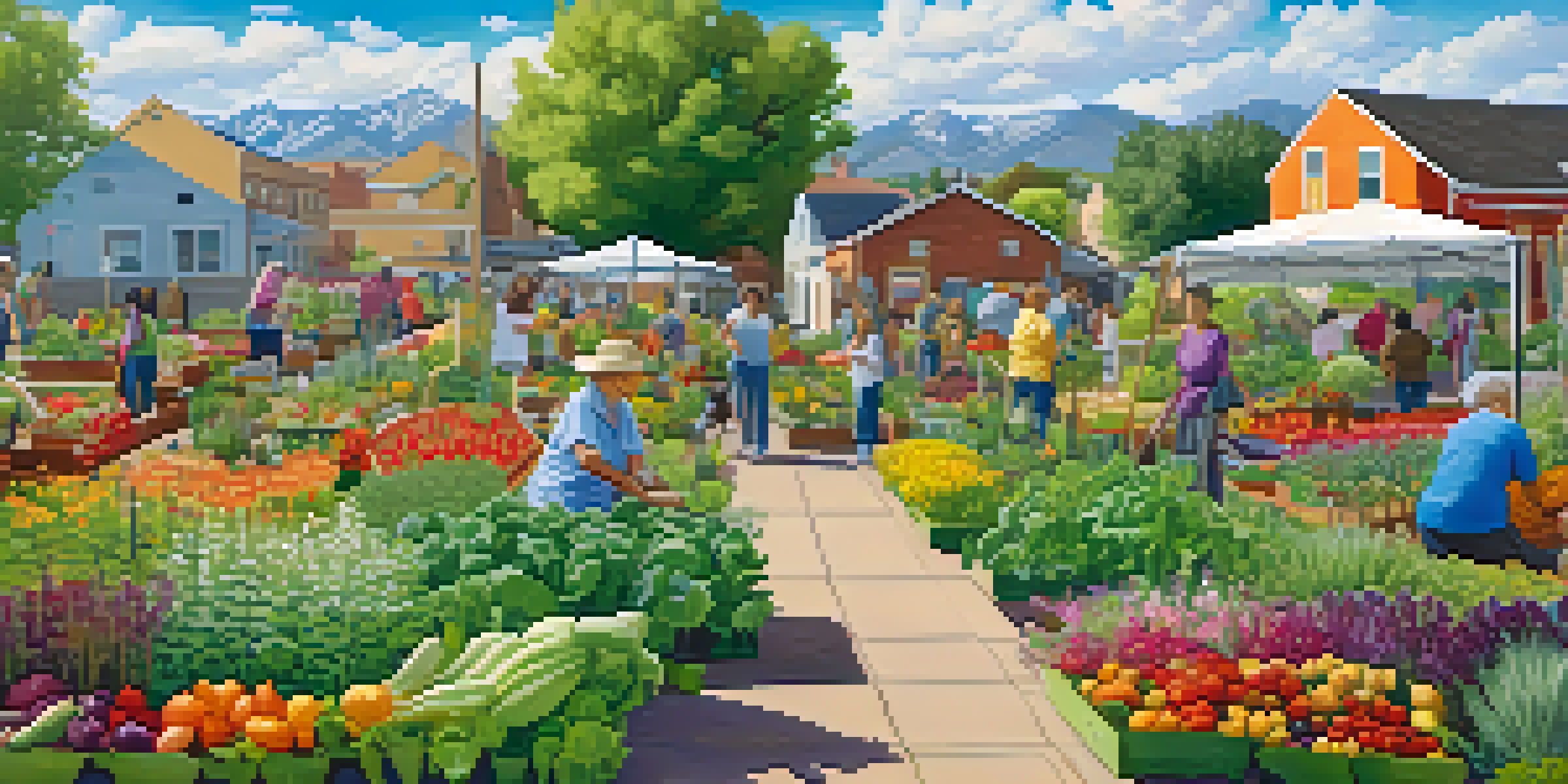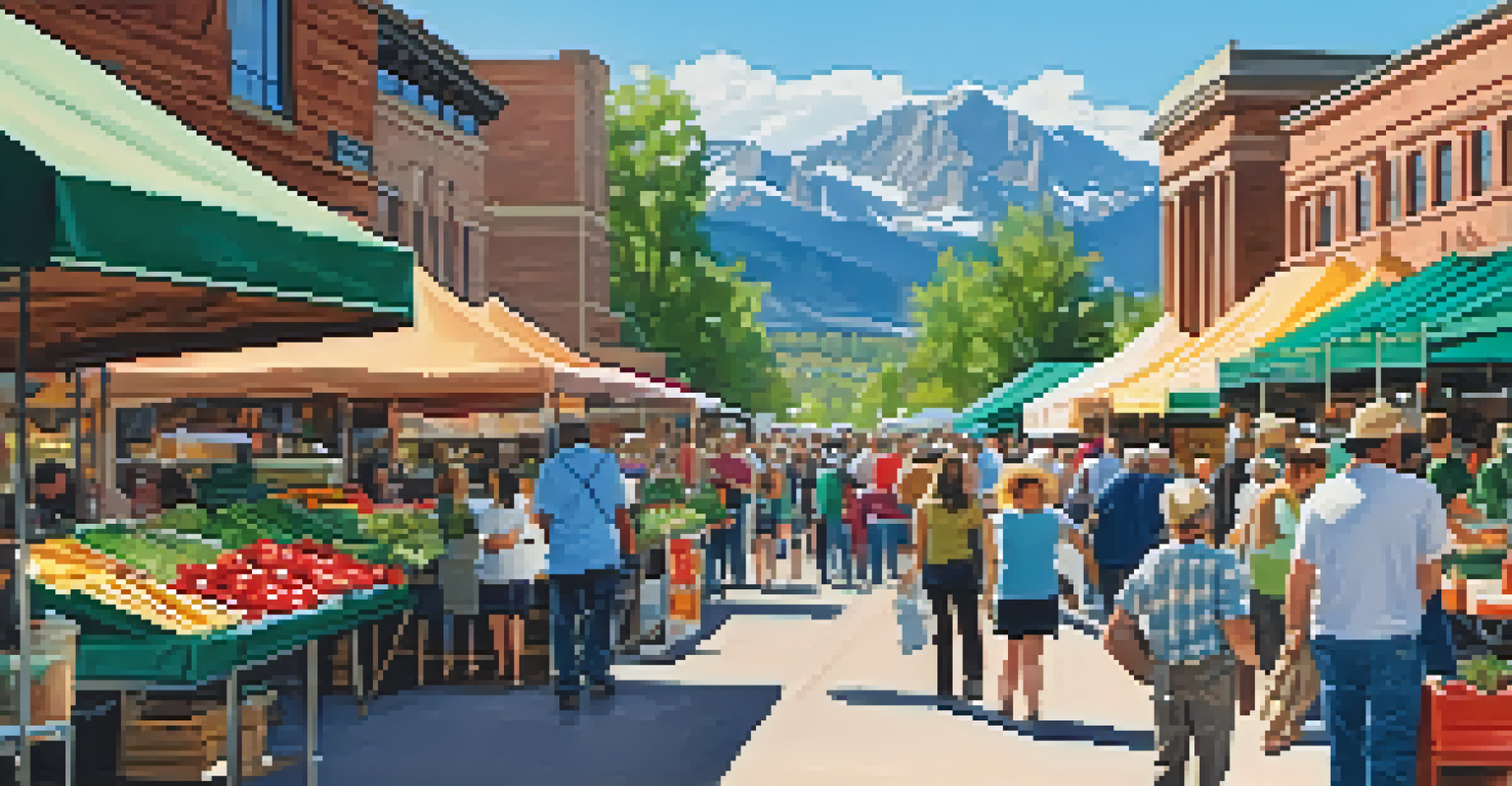Understanding Boulder's Food Security Challenges and Solutions

Defining Food Security: What It Means for Boulder
Food security refers to the availability and access to sufficient, safe, and nutritious food for all individuals. In Boulder, this means not just having enough food, but also ensuring that it meets the dietary needs of its diverse population. Understanding food security is crucial as it impacts health, education, and overall well-being in the community.
Food security is not just about having enough food; it's about having access to the right kind of food that meets the needs of a diverse population.
In a city like Boulder, which is often seen as affluent, the complexities of food insecurity can be overlooked. Many residents, despite living in a prosperous environment, face challenges such as high living costs and unexpected emergencies that disrupt their food access. This can lead to a paradox where food insecurity exists alongside abundance.
Boulder's unique mix of students, low-income families, and the elderly means that food security isn't just a simple issue of supply and demand. Various factors, from economic disparities to cultural food preferences, influence how food security manifests in the community. Understanding these nuances is the first step towards addressing the challenges.
Current Food Security Statistics in Boulder
Recent studies indicate that nearly 10% of Boulder's residents experience food insecurity, a significant figure that highlights the need for action. These statistics reveal that thousands of people struggle to secure enough healthy food, often relying on local food banks and assistance programs. Understanding these numbers helps the community grasp the extent of the issue.

Additionally, the demographic breakdown of food insecurity shows that families with children and individuals on fixed incomes are particularly vulnerable. This stark reality underscores the importance of targeted interventions that address the specific needs of these groups. By recognizing who is most affected, Boulder can tailor its solutions more effectively.
Food Insecurity Affects Many in Boulder
Nearly 10% of Boulder's residents face food insecurity, highlighting the need for targeted interventions.
The impact of food insecurity extends beyond immediate hunger; it can lead to long-term health issues such as obesity and diabetes, which further strain local healthcare resources. This cycle of poor health and limited access to nutritious food highlights the urgency of addressing food security in Boulder. Without intervention, the situation may worsen, affecting future generations.
Barriers to Food Security in Boulder
Several barriers contribute to food insecurity in Boulder, with economic factors being primary among them. The rising cost of living, coupled with stagnant wages for many, makes it increasingly difficult for residents to afford nutritious food. This economic strain often forces individuals to make tough choices between paying bills and buying groceries.
The greatest challenge of our time is ensuring that everyone has access to nutritious food, which is essential for health, education, and overall well-being.
Transportation is another significant barrier. Many low-income residents may not have access to reliable transportation, making it challenging to reach grocery stores that offer affordable, healthy options. This lack of access can lead to reliance on convenience stores, which often stock less nutritious food, exacerbating health issues.
Cultural and language barriers also play a role in food security challenges. For families from diverse backgrounds, navigating the food system can be daunting, especially if they face language obstacles or lack familiarity with local resources. Addressing these barriers requires community outreach and education to ensure that everyone knows where to find help.
Local Initiatives Addressing Food Security
Boulder has launched several initiatives aimed at improving food security, including community gardens and urban farming projects. These efforts not only provide fresh produce but also foster a sense of community and empowerment among residents. By engaging citizens in food production, Boulder promotes self-sufficiency and healthier eating habits.
Another key initiative is the expansion of food assistance programs, such as SNAP and local food pantries, which offer critical support to those in need. These programs work to reduce barriers, ensuring that residents have access to nutritious food regardless of their financial situation. Collaboration between local organizations has made these programs more effective and far-reaching.
Barriers Complicate Food Access
Economic factors, transportation issues, and cultural barriers hinder many residents from accessing nutritious food.
Additionally, educational programs are being implemented to teach residents about nutrition, cooking, and budgeting for food. By equipping individuals with knowledge and skills, Boulder aims to create a more resilient community that can navigate food challenges independently. This holistic approach is essential for fostering long-term food security.
The Role of Community Organizations
Community organizations play a vital role in addressing food security in Boulder. Nonprofits like the Community Food Share work tirelessly to connect individuals with resources and food assistance. Their efforts not only provide immediate relief but also engage the community in discussions about long-term solutions to food insecurity.
Local churches and community centers also contribute significantly by hosting food drives and providing meals to those in need. These grassroots efforts create a safety net for the most vulnerable populations, ensuring that no one goes hungry. The collaboration among these organizations amplifies their impact and fosters a sense of solidarity within the community.
Furthermore, these organizations often collaborate with local government and businesses to create comprehensive solutions. By pooling resources and expertise, they can develop programs that address the root causes of food insecurity, rather than just the symptoms. This collaborative approach is crucial for creating a sustainable food system in Boulder.
Advocacy for Policy Changes
Advocacy for policy changes is a critical component of improving food security in Boulder. Local activists and organizations are working to influence legislation that supports food access and sustainability. By raising awareness about food insecurity, they aim to encourage policymakers to prioritize these issues in their agendas.
Efforts such as promoting local food sourcing and supporting small farmers not only enhance food security but also strengthen the local economy. When residents invest in local agriculture, they help create a more resilient food system. This interconnectedness between food security and economic stability is vital for the community's overall health.
Community Initiatives Foster Solutions
Local organizations and initiatives, like community gardens and food assistance programs, are essential in addressing food security challenges.
Moreover, advocating for affordable housing and living wages is essential to address the root causes of food insecurity. By ensuring that residents can afford basic needs, Boulder can significantly reduce the number of individuals facing food challenges. This holistic approach reflects a commitment to social equity and community well-being.
Looking Ahead: Ensuring a Food Secure Future
To ensure a food-secure future for Boulder, ongoing collaboration among residents, organizations, and local government is essential. Building on existing initiatives and fostering new partnerships will help create sustainable solutions that adapt to the community's changing needs. A collective effort is vital for addressing the complexities of food security.
Education and awareness campaigns can further empower residents to take action in their own lives. By promoting the benefits of nutrition and local food systems, Boulder can cultivate a culture of health and self-reliance. Engaging the community in these discussions will help generate innovative ideas and solutions.

Ultimately, the goal is to create a resilient food system that prioritizes access to healthy food for all. With continued dedication and collaboration, Boulder can lead the way in tackling food insecurity, setting a positive example for other communities facing similar challenges. The future looks bright if we work together.